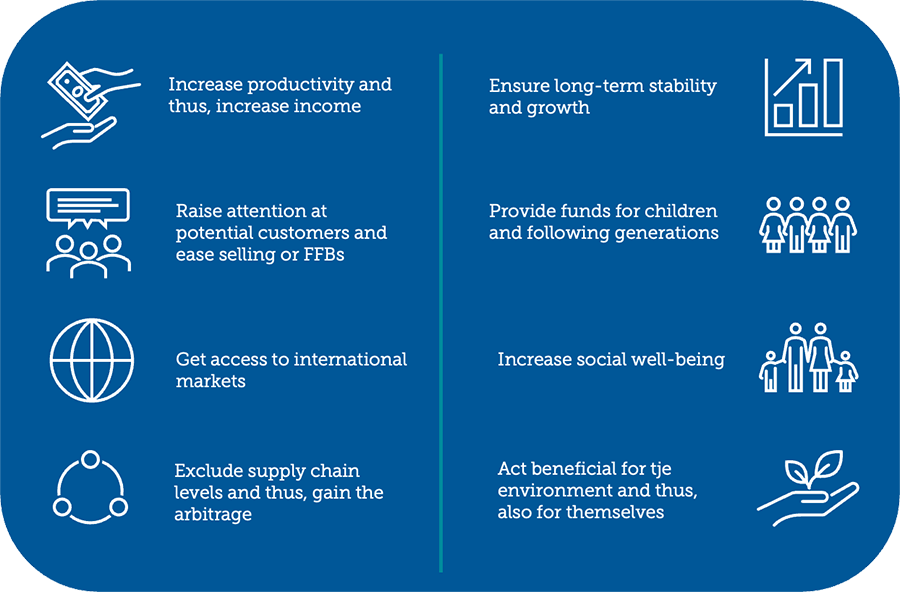Independent Smallholders
Until today, the majority of the world’s farms are managed by Independent Smallholders. Altogether those small farms operate around one tenth of the world’s agricultural land; small farms even account for an estimated 40% of the total acreage. An investment in family-run agriculture provides an opportunity to reduce poverty, but unfortunately, small-scale farming can also lead to deforestation, biodiversity loss and social issues due to a lack of knowledge and financial resources. Sustainability certification of Independent Smallholders contributes to environmental protection and social welfare.
What is the Independent Smallholder (ISH) Certification Scheme?
ISH certification is a group certification under the scope of a Central Office (CO) and is applicable to Independent Smallholders producing any kind of crops including palm fresh fruit bunches (FFBs). The CO is the holder of the ISCC certificate and is responsible for certain tasks like ISH management, administration, subcontractors, or fund management. However, it does not take legal ownership of the material produced by the ISH at any time.
Requirements for Independent Smallholder Certification
Conditions, Which are Exclusively Relevant for ISH Certification, are:
- Independent smallholders (ISH) under this standard are farmers, that grow crops on own land and fulfill certain additional requirements such as belonging to an organizational structure such as a cooperative and have access to supply chain.
- Land falling under the classification of ISH land is defined by: size – planted area is less than 50 hectares
- Family-owned: Labour is principally provided by family and farm provides the major source of income
- Independence: Freedom to choose how to use land, which crops to plant and how to manage them. The land is not contractually bound to any oil mill and may receive support or extension services from government agencies or other support system (e.g., ISCC).
Benefits of Independent Smallholder Certification
ISCC Certification can Help Independent Smallholders to:

How to Attain an ISCC Independent Smallholder Certification
The Independent Smallholder Certification system is based on a three-step train-the-trainer concept. ISCC provides training for master trainers. These master trainers in turn provide ISH Training for a Central Offices (CO) which in turn may qualify their own trainers so that in the end, the Independent Smallholders are being trained by their Central Office.
1. Set up a Central Office (CO) Organisation
An important precondition for becoming ISCC certified, the ISH shall belong to an organisation, e.g. cooperative. The eligibility of such an organisation will be checked by ISCC. On positive feedback the ISH organisation is asked to provide the ‘boundary polygon of the area in which ISH are located. ISCC will conduct a land use change and eligibility analysis for this area without costs.
2. Arrange for ISH Training
The CO will introduce necessary steps for the ISH training and start training of about 50 ISH. Part of the training involves the use of mobile Apps and the Faramo System, which allow for easy data mapping including ISH field polygons. The Faramo System enables also traceability back to the origin for oil mills and other processing plants. Besides this the training aims to support the smallholders in setting up or adapting an organisational structure beneficial for certification and to raise awareness of good agricultural practices in order for smallholders to increase productivity.
3. Conduct a Baseline Audit and Implement Corrective Measures
A baseline audit has to be conducted by trained staff of the CO in order to better understand the status quo and to identify gaps towards certification and to design a customized training program for smallholders. Results of the audit are discussed in order to identify and implement corrective actions. This internal baseline audit is mandatory for every ISH who wants to become certified.
4. Become Certified
The last step is the audit by an independent external certification body (CB). The CB needs to cooperate with ISCC. The auditors of the CB need to prove participation in the ISCC basic and ISH training. During the audit the compliance with the 6 ISCC principles is checked (e.g. the protection of land with high biodiversity value or high carbon stock as well as several ecological and social requirements and management practices). The audit is based on samples (sqrt of number of ISH) as selected by the auditor.